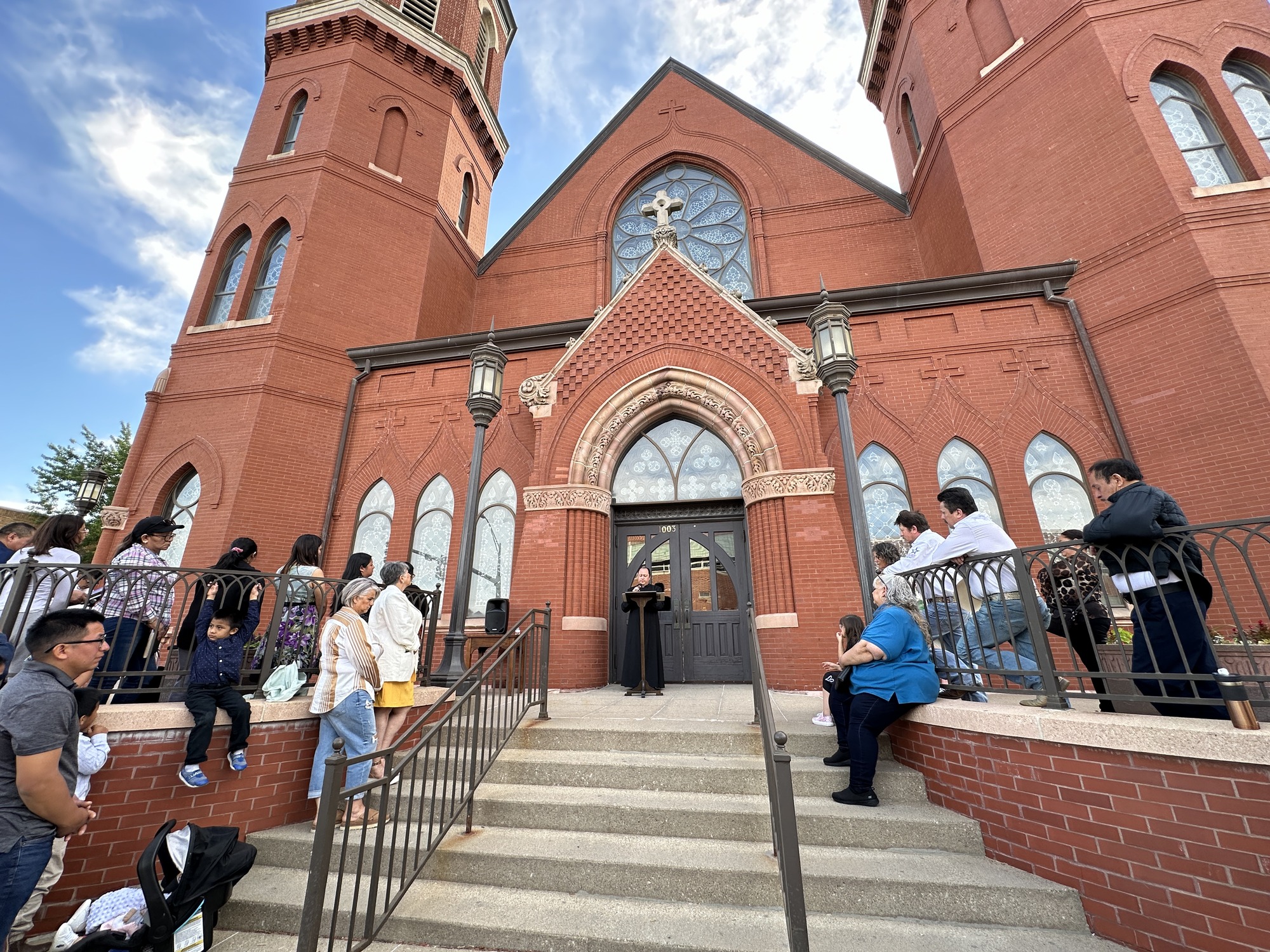Dignity for every person – the church responds/Dignidad para cada persona – la Iglesia responde
-
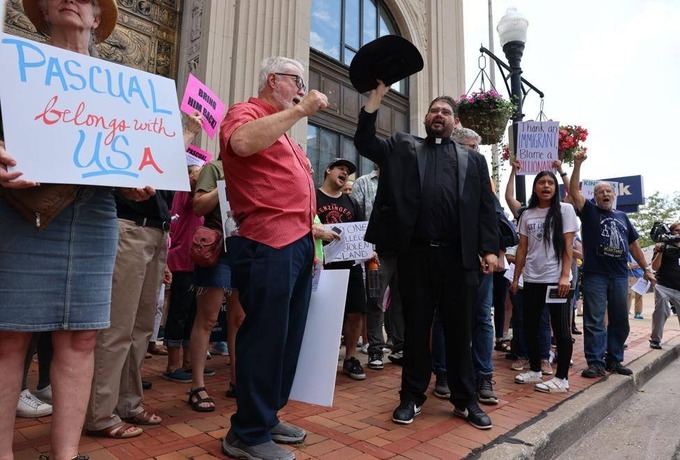 July 17, 2025Dignidad para cada persona - la Iglesia responde
July 17, 2025Dignidad para cada persona - la Iglesia responde
(bilingual/bilingüe- English below)
(Foto de Escucha Mi Voz Iowa)
Por DAWN PROSSER
Directora de comunicación
Columna
“El mundo existe para todos, porque todos los seres humanos nacemos en esta tierra con la misma dignidad. Las diferencias de color, religión, capacidades, lugar de nacimiento, lugar de residencia y tantas otras no pueden anteponerse o utilizarse para justificar los privilegios de unos sobre los derechos de todos. Como comunidad, tenemos la obligación de asegurarnos que cada persona vive con dignidad y tiene las oportunidades suficientes para su desarrollo integral.” (Papa Francisco, sobre fraternidad y amistad social [Fratelli Tuitti] num. 118).
Son momentos inciertos para los inmigrantes en EE.UU. y las parroquias católicas. Por muy preocupantes que sean las noticias sobre el aumento de aplicación de leyes y de mayor temor en las comunidades inmigrantes, también hay numerosos informes sobre la reacción de la Iglesia Católica para "garantizar que cada persona viva con dignidad".
En la Arquidiócesis vecina de Omaha, el recién instalado arzobispo Michael McGovern compartió un video en redes sociales, el 11 de junio- el día de la redada a Glen Valley Foods en Omaha, por parte de inmigración. Docenas fueron detenidos, algunos deportados y el suceso fue ampliamente reportado por todo el país. Arzobispo McGovern“Les aseguro que abogare por un trato respetuoso para todos dentro de la ley. Muchos se sientes ansiosos y con miedo. Por favor sepan de la cercanía y amistad de Jesús y su cuerpo la iglesia, así como de la protección de Nuestra Señora de Guadalupe y los Santos. La iglesia está aquí para ustedes. Estoy rezando por ustedes. Oremos juntos por una resolución justa y pacífica a esta molesta situación. Dios te bendiga y te guarde.” De la traducción al inglés del mensaje proveído por el arzobispo McGovern’s.
Arzobispo McGovern“Les aseguro que abogare por un trato respetuoso para todos dentro de la ley. Muchos se sientes ansiosos y con miedo. Por favor sepan de la cercanía y amistad de Jesús y su cuerpo la iglesia, así como de la protección de Nuestra Señora de Guadalupe y los Santos. La iglesia está aquí para ustedes. Estoy rezando por ustedes. Oremos juntos por una resolución justa y pacífica a esta molesta situación. Dios te bendiga y te guarde.” De la traducción al inglés del mensaje proveído por el arzobispo McGovern’s.
Al este de nosotros la Diócesis de Davenport, reporto la semana pasada en The Catholic Messenger que el Servicio de Inmigración y Control de Aduanas de EE. UU. (ICE por sus cifras en inglés) reporto a un feligrés de 20 años de edad, de West Liberty, a Guatemala. Pascual Pedro había vivido en los EE. UU. desde los 13 años, se graduó de la escuela secundaria y se confirmo en su parroquia. Pedro estaba trabajando y era jugador en un equipo de fútbol local. Él fue arrestado y detenido en su revisión anual con el Servicio de Inmigración y Control de de EE. UU. el primero de julio.
Los compañeros feligreses de Pedro tuvieron vigilias de oración en la iglesia y fuera de la cárcel donde él estaba antes de ser deportado. El Padre Guillermo Treviño, pastor y padrino de Pedro mando una carta al editor del Cedar Rapids Gazette, publicada el 15 de julio, señalando a funcionarios electos porque sentía que "ninguno ha abordado verdaderamente la injusticia en la deportación de Pascual".
Dispensaciones
Arzobispo Edward J. Weisenburger de Detroit, en el medio oeste del país, compartió en X el 14 de julio, que se unión ala marcha pacífica con cientos de manifestantes que caminaban hacia la oficina del Servicio de Inmigración y Control de de EE. UU. en Detroit. Dijo ver sido motivado por el mensaje en el evangelio, “Todos hemos heredado la dignidad. Reconocemos esta dignidad por encima de todo y buscamos que nuestra nación vuelva a sus raíces de acompañamiento y bienvenida.”
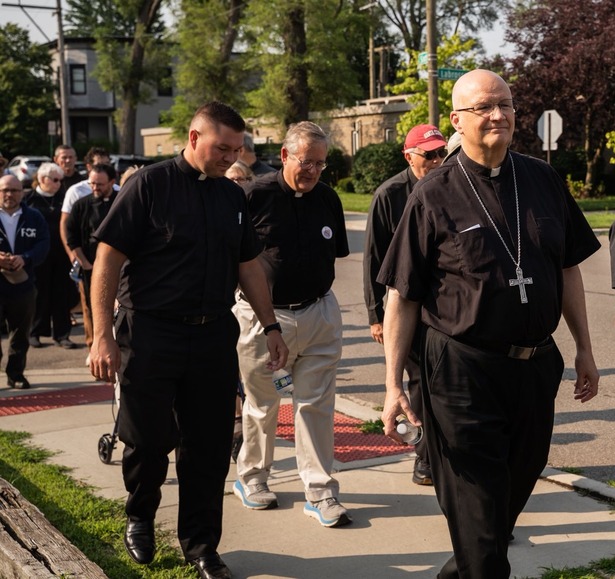 Arzobispo Edward J. Weisenburger de DetroitEl mensaje fue publicado con la foto del arzobispo simplemente vestido con una camisa clerical de manga corta, pantalones negros y una cruz pectoral, caminando junto a sus sacerdotes.
Arzobispo Edward J. Weisenburger de DetroitEl mensaje fue publicado con la foto del arzobispo simplemente vestido con una camisa clerical de manga corta, pantalones negros y una cruz pectoral, caminando junto a sus sacerdotes.
Fue reportado ampliamente que el obispo Alberto Rojo de San Bernardino (California) emitió un decreto el 8 de julio para dispensar a los feligreses inmigrantes de su obligación de asistir a la misa dominical debido al temor de una posible aplicación de ley migratoria.
Hay un temor real que se apodera de muchos en nuestras comunidades parroquiales de que, si se aventuran a salir a cualquier tipo de lugar público, serán arrestados por un oficial de inmigración, lamentablemente esto incluye asistir a misa. Quiero que nuestras comunidades inmigrantes sepan que su iglesia está con ellos y camina con ellos en este momento difícil,” de la declaración que acompañaba el decreto del obispo.
Al día siguiente, Axios y otros medios de comunicación publicaron un artículo donde la Diócesis de Nashville “emitió un decreto parecido en mayo, después de que los funcionarios notaron una disminución en asistencia a los servicios de misa en español.
No estamos inmunes
A medida que la Diócesis de Sioux City crece en diversidad, nuestros feligreses inmigrantes no son inmunes al reciente aumento de miedo, independientemente de su estatus migratorio.
La parroquia de la Catedral en Sioux City, la más grande en la diócesis, regularmente tiene entre 2,500-3,000 asistiendo a misa dominical. La mayoría asiste a misa en español y se estima que el 86% es minoría mayoritariamente hispana.
Padre David Esquiliano, pastor e inmigrante, confirmo que hay miedo entre sus feligreses, de los cuales muchos tienen décadas viviendo en el área. “Es un tema común en estos días,” dijo.
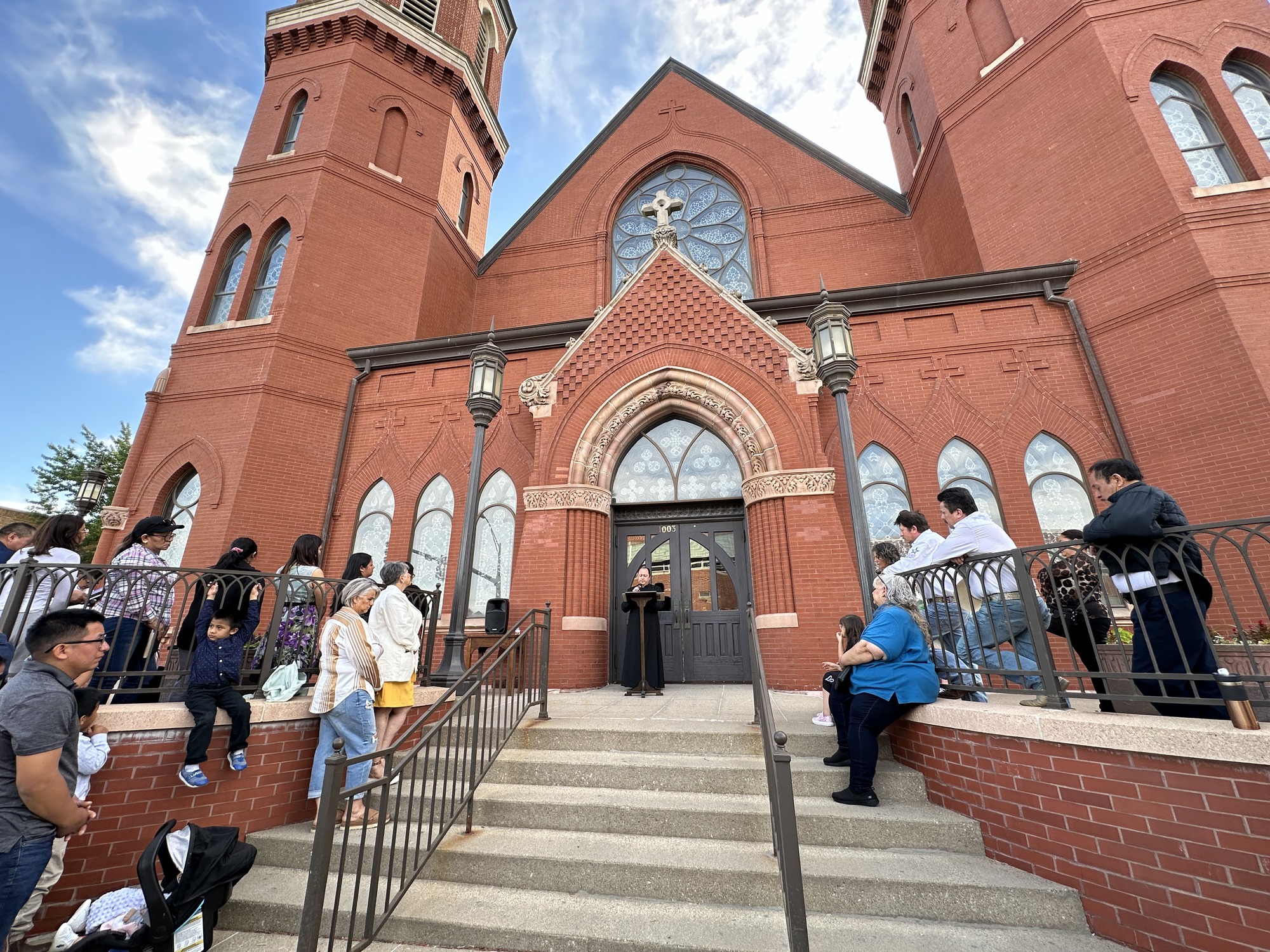 Catedral de epifanía Sioux CityLos pueblos pequeños de la Diócesis de Sioux City no son inmunes al miedo generalizado. El padre Joseph Dillinger, párroco de la parroquia St. Joseph de Wall Lake, el cual también celebra misas en Sac City, ofreció su apoyo. En boletines parroquiales recientes, ha indicado que estaría disponible para acompañar a su cita de inmigración a cualquier persona que tenga miedo de ir sola o simplemente necesite que alguien le acompañe…..hablo un poco de español.”
Catedral de epifanía Sioux CityLos pueblos pequeños de la Diócesis de Sioux City no son inmunes al miedo generalizado. El padre Joseph Dillinger, párroco de la parroquia St. Joseph de Wall Lake, el cual también celebra misas en Sac City, ofreció su apoyo. En boletines parroquiales recientes, ha indicado que estaría disponible para acompañar a su cita de inmigración a cualquier persona que tenga miedo de ir sola o simplemente necesite que alguien le acompañe…..hablo un poco de español.”
El sacerdote también escribió una carta al editor el 28 de junio para el periódico The Sioux City Journal expresando su tristeza por las personas inocentes detenidas o los que han sido “racialmente perfilados.”
“A los que tienen miedo, estoy con ustedes. Conozco su miedo… Estaré a su lado porque son mi hermano y hermana,” escribió el padre Dillinger. “Todas las personas merecen ser tratados con dignidad y respeto, independientemente de su color de piel.”
Además de aquellos que temen un aumento en la aplicación de medidas migratorias, algunos de nuestros hermanos y hermanas en Cristo con estatus de protección temporal (TPS por sus cifras en inglés) recibieron un golpe a su seguridad esta semana. Algunos viven en Iowa y dentro de la diócesis.
Los medios reportaron el 14 de julio, que más de 11,000 inmigrante afganos con TPS perderán su protección a partir del 14 de julio. De acurdo a Bloomberg Law, esto significa que perderán su autorización de trabajo y protección contra la deportación.
“Esta es una de las primeras designaciones de TPS que expiraron después del cambió en póliza de la administración migratoria,” del boletín electrónico de The National Immigration Forum, The Forum Daily.
Al día siguiente, Associated Press informó que un tribunal de apelaciones dictaminó que el TPS para inmigrantes afganos permanecería vigente hasta el 21 de julio mientras continúa la demanda.
Para nosotros no son refugiados sin nombre o cara. Cuatro años atrás, mi esposo y yo tuvimos la oportunidad de pasar una semana ayudando a afganos refugiados recién llegados a aclimatarse a su nuevo hogar. Muchos habían ayudado al ejercito estadounidense y huyeron de sus hogares por miedo cuando el talibán tomo control de su país.
A los pocos meses de que los refugiados se establecieran por todo el país, tenían pocas o ningunas posesión. En Sioux City, Mary J. Treglia Community House y Lutheran Servises en Iowa, ayudaron en los esfuerzos de reubicación de algunos afganos recién llegados y refugiados de otros países.
Pasamos muchas horas con refugiados afganos, especialmente con los niños, jugando, ayudándoles con manualidades y ayudándoles a aprender inglés. Aprendieron rápido. Todavía tengo una pulsea colorida que hizo para mí un joven refugiado.
A menudo nos preguntamos qué pasaría con ellos y rezamos para que estén felices, saludables y seguros.
Cada ser humano esta echo a imagen y semejanza de Dios, merecedor de dignidad y “suficientes oportunidades para su desarrollo integral.”
ENGLISH
Commentary by DAWN PROSSER
Director of Communications
(Cover photo courtesy of Escucha mi Voz Iowa. Rally outside the Davenport congress building, pleading for the release of a young Davenport man who was deported.)
“The world exists for everyone because all of us were born with the same dignity. Differences of color, religion, talent, place of birth or residence, and so many others, cannot be used to justify the privileges of some over the rights of all. As a community, we have an obligation to ensure that every person lives with dignity and has sufficient opportunities for his or her integral development.” (Pope Francis, On Fraternity and Social Friendship [Fratelli Tutti], no. 118).
It is an unsettling time for immigrants in the U.S. and in Catholic parishes. As troubling as the news is regarding increased immigration enforcement and heightened fear in immigrant communities, there are also numerous reports of the Catholic Church’s reaction to “ensure that every person lives with dignity.”
In the neighboring Archdiocese of Omaha, newly-installed Archbishop Michael McGovern posted a video in Spanish on social media June 11 – the day of workplace raid by immigration authorities at Glenn Valley Foods in Omaha. Dozens were detained at the time, some deported and the event was widely reported throughout the country.
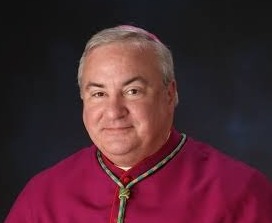 Archbishop McGovern/Archdiocese of Omaha“I assure you that I will advocate for the respectful treatment of all within the law. Many may feel anxious or afraid. Please know of the closeness and friendship of Jesus and of his body the church as well as the protection of Our Lady of Guadalupe and the saints. The church is here for you. I am praying for you. Let us pray together for a just, peaceful resolution to this upsetting situation. May God bless you and keep you,” from the English translation of Archbishop McGovern’s message provided by the archdiocese.
Archbishop McGovern/Archdiocese of Omaha“I assure you that I will advocate for the respectful treatment of all within the law. Many may feel anxious or afraid. Please know of the closeness and friendship of Jesus and of his body the church as well as the protection of Our Lady of Guadalupe and the saints. The church is here for you. I am praying for you. Let us pray together for a just, peaceful resolution to this upsetting situation. May God bless you and keep you,” from the English translation of Archbishop McGovern’s message provided by the archdiocese.
Just east of us in the Diocese of Davenport, The Catholic Messenger reported last week that ICE deported a 20-year-old West Liberty parishioner to Guatemala. Pascual Pedro had lived in the United states since age 13, graduated from high school and was confirmed in his parish. Pedro was working and played on a local soccer team. He was arrested and detained at his annual ICE check-in on July 1.
Pedro’s fellow parishioners held prayer vigils at the church and outside of the jail where he was held before his deportation. Father Guillermo Treviño, Pedro’s pastor and godfather submitted a letter to the editor to the Cedar Rapids Gazette, published July 15, calling out elected officials as he felt “none have truly grappled with the injustice at the heart of Pascual’s deportation.”
Dispensations
Midwestern Archbishop Edward J. Weisenburger of Detroit posted on X July 14 that he joined a peace group of hundreds of marchers walking towards the Detroit ICE (Immigration and Customs Enforcement) field office. He said he was motivated by the Gospel message, “Everyone has inherent dignity. We recognize this dignity above all else and seek to bring our nation back to its roots of charity, accompaniment and welcome.”
 From Detroit Archbishop Edward Weisenburger's X account.It was posted with a photo of archbishop simply clad in a short-sleeved clerical shirt, black pants and pectoral cross walking alongside his priests.
From Detroit Archbishop Edward Weisenburger's X account.It was posted with a photo of archbishop simply clad in a short-sleeved clerical shirt, black pants and pectoral cross walking alongside his priests.
It was widely reported that Bishop Alberto Rojas of San Bernardino (California) issued a decree July 8 to dispense immigrant parishioners from their Sunday Mass obligation due to the fear of potential immigration enforcement.
“There is a real fear gripping many in our parish communities that if they venture out into any kind of public setting, they will be arrested by immigration officers. Sadly, that includes attending Mass. I want our immigrant communities to know that their church stands with them and walks with them through this trying time,” from a statement accompanying the bishop’s decree.
Axios and other news outlets published an article that the next day, the Diocese of Nashville “issued a similar decree in May after officials noticed a significant decline in attendance at Spanish-speaking Mass services.”
We are not immune
As the Diocese of Sioux City grows in diversity, our immigrant parishioners are not immune from the recent rise in fear, regardless of their immigration status.
The Cathedral Parish in Sioux City, the largest in the diocese, regularly has 2,500-3,000 attending weekend Masses. The majority attend Spanish Masses and the parish is an estimated 86% minority – mostly Hispanic.
Prayer vigil for immigrants outside of the Cathedral of the Epiphany./Lumen file photoFather David Esquiliano, pastor and himself an immigrant, confirms that there is fear amongst his parishioners, many who have lived in the area for decades.
“It’s a common subject nowadays,” he said.
Small towns in the Diocese of Sioux City are not immune from the heightened fear. Father Joseph Dillinger, pastor of Wall Lake St. Joseph Parish with Masses also held in Sac City offered his support. He has included in recent parish bulletins that he would be available to accompany anyone to their immigration appointment “who is afraid to go alone or just needs someone to be with them … hablo un poco de español.”
The priest also wrote in a June 28 letter to the editor to the Sioux City Journal that he was saddened by innocent people detained or “who have been racially profiled.”
“To those who are afraid, I stand with you. I know your fear … I will stand by your side because you're my sister and brother,” Father Dillinger wrote. “Every person deserves to be treated with dignity and respect, regardless of skin color.”
In addition to those fearing increased immigration enforcement, some of our brothers and sisters in Christ with Temporary Protected Status TPS received a blow to their security this week. Some live in Iowa and within the diocese.
The media reported July 14 that over 11,000 Afghan TPS holders would lose their protected status as of July 14. This meant that they would lose their work authorization and protection from deportation, according to Bloomberg Law.
“This is one of the first TPS designations to expire after the administration’s immigration policy shift,” from The National Immigration Forum’s e-newsletter, The Forum Daily.
The next day, the Associated Press reported that an appeals court ruled that the TPS for Afghan immigrants would stay in place until July 21 as “litigation continues.”
They are not faceless and nameless refugees for us. Four years ago, my husband and I had the unique opportunity to spend a week helping newly-arrived Afghan refugees acclimate to their new home. Many had assisted the U.S. military and fled their homes in fear when the Taliban took over their country.
Within a few months, the refugees were resettled in communities throughout the country. They had little or no possessions. In Sioux City, the Mary J. Treglia Community House and Lutheran Services in Iowa assisted the resettlement efforts for some Afghan newcomers and refugees of other countries.
We spent many hours with the Afghan refugees, especially the children - playing games, helping them with crafts and helping them learn English. They learned quickly. I still have the colorful beaded bracelet that a young refugee child made and gave to me.
We often wonder what happened to them and pray they are happy, healthy and safe.
Each human being is made in the image and likeness of God, deserving of dignity and “sufficient opportunities for his or her integral development.”
HOME

